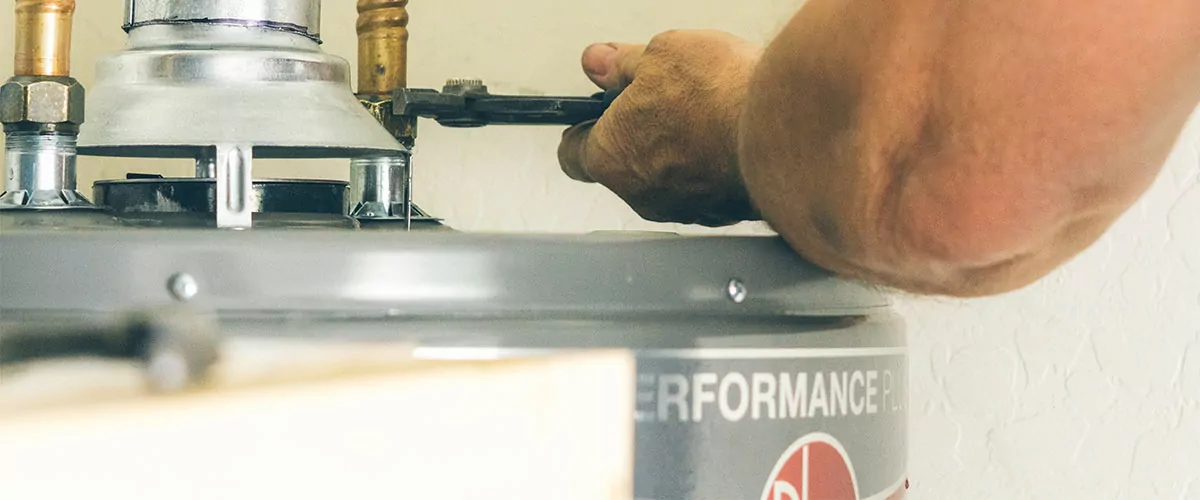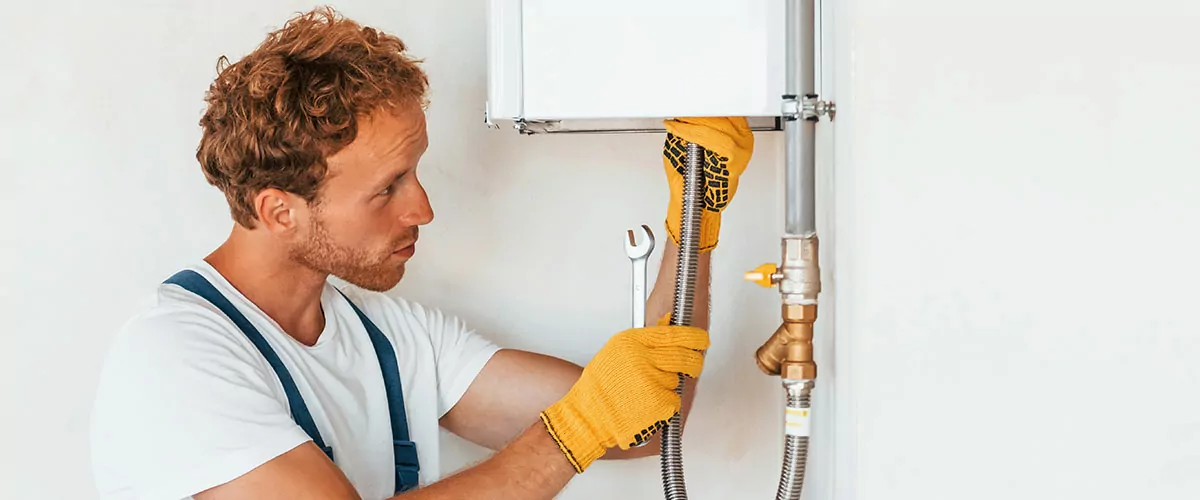
Who Installs Tankless Water Heaters?
Table of Contents
If you’re considering making the switch, you’re probably curious about the ins and outs of these modern systems, including who installs tankless water heaters.
When it comes to home improvements, one shift that’s gaining popularity is the move from traditional water heaters to tankless water heaters.
Traditional vs. Tankless Water Heaters

Before diving deep into tankless water heater installation, it’s essential to grasp the primary differences between traditional and tankless heaters.
Traditional water heaters use a tank to store and heat water. This tank water heater keeps the water at a set temperature, waiting for you to need it. On the other hand, tankless water heaters sometimes referred to as on-demand or point-of-use heaters, heat water only when you need it.
Instead of storing hot water in a large tank, these energy-efficient devices provide a continuous supply of hot water on the spot.
Advantages of Tankless Systems
Space-saving: Unlike bulky traditional water heaters, tankless heaters have a compact design.
Continuous supply of hot water: No more waiting for the tank to refill or reheat; get hot water anytime you turn on the tap.
Energy efficiency: Tankless water heaters only heat water when required, reducing energy consumption.
Who Installs Tankless Water Heaters?
1. Licensed Plumbers
Plumbing expertise like Chambliss Plumbing are crucial for a tankless water heater installation. Proper water flow and connection are vital to ensure your tankless water heater works efficiently. Licensed plumbers possess the knowledge and skills needed to make sure the water flow is correctly established.
Furthermore, depending on the type of water heater you choose—gas or electric—a plumber will ensure the right connections are made. Gas water heaters might need a propane tank, while electric tankless water heaters will need specific electrical connections.
Always consider water heater installation costs, as a licensed plumber might have varying rates based on the complexity of the installation.
2. HVAC Technicians
In some cases, HVAC professionals might be involved in the installation, especially if your home’s heating system integrates with the water heater.
For homes that use a combined hot water heater and heating system, an HVAC expert might be the best choice.
If you’re installing a larger, whole-house tankless water heater, it’s not uncommon for an HVAC tech to play a role in ensuring proper ventilation and integration with the home’s existing systems.
3. Specialized Tankless Water Heater Installers
As the name suggests, these are professionals or companies dedicated solely to tankless water heater installations. They possess specific expertise in various brands and models of tankless heaters.
If you’re looking for someone who knows the ins and outs of a particular brand or type of tankless heater, these specialized installers might be the way to go.
Just as with any other professional, it’s essential to research and compare water heater installation costs to get the best deal.
DIY Installation: Pros and Cons
For the hands-on homeowner, the allure of installing a new tankless water heater without professional help can be tempting. After all, it seems like an opportunity to save on the installation cost. But is it a wise decision?
Pros:
Potential Savings: One of the primary motivations for DIY is to save on installation costs. If you have the necessary tools and feel confident, you might be able to install a tankless unit for a fraction of the price.
Cons:
Voided Warranties: Some manufacturers strictly advise against DIY installations. If you don’t use certified tankless water heater plumbers, you may void the warranty, making any subsequent repairs or replacements costly.
Potential Hazards: If not installed correctly, both electric tankless water heaters and propane tankless water heaters can present risks. Proper connections are essential for safety. A small mistake may need expensive repairs or even pose dangers like gas leaks or electrical fires.
Improper Setup: Without the right expertise, you may not set up the water heater optimally, leading to decreased efficiency or reduced lifespan of the unit.
Manufacturer Guidelines: It’s essential to follow the manufacturer’s guidelines in the letter. However, without prior experience, some instructions might seem ambiguous or easy to misinterpret.
Benefits of Professional Installation

While DIY might seem appealing initially, the benefits of professional installation are numerous and often outweigh the upfront savings.
Safety First: Professionals ensure proper gas, electric, and water connections, minimizing risks. They’re trained to handle both electric and propane tankless water heaters, ensuring safe operations.
Optimal Performance: A correctly installed water heater will operate at its best. Professionals have the experience to make sure your unit runs efficiently, giving you the most out of your new tankless water heater.
Warranty and Support: By using certified tankless water heater plumbers, you’ll likely preserve the manufacturer’s warranty. Additionally, many professionals offer post-installation support, so if any issues arise, you have experts to turn to.
Peace of Mind: There’s a unique comfort in knowing that an expert handled the job. You can rest easy, and confident in the longevity and safety of your water heater.
Choosing the Right Installer
Selecting the right professional to install your tankless water heater is crucial for optimal performance and safety.
Research: Start by seeking recommendations from friends or neighbors. Online platforms also offer reviews and ratings.
Credentials & Licenses: Ensure the installer has the necessary credentials. Licenses validate their competence and adherence to industry standards.
References: Don’t hesitate to ask for references or photos of past installation jobs to gauge the quality of their work.
Warranty & Support: Discuss warranty terms. A good installer will also offer post-installation support.
Compare Quotes: Don’t settle for the first quote. Compare rates from multiple installers to get the best value.
Remember, investing a little time in choosing the right installer can save you from future hassles and ensure your water heater’s longevity.
Conclusion
The transition to tankless water heaters offers a host of benefits, from energy efficiency to continuous hot water supply. While the allure of DIY installation might seem tempting, the complexities involved make seeking professional help a wise choice.
By investing time in selecting the right installer and understanding the installation process, homeowners can ensure optimal performance, safety, and longevity of their units. After all, with the right decisions, you can enjoy the comforts of endless hot water without a hitch. Ready to make the switch? Call us at (210) 490-7910.
Frequently Asked Questions
Does a tankless water heater need any special installation?
Yes, a tankless water heater often requires a specialized installation process. This is because they might need upgraded gas pipes, a new ventilation system, or electrical changes. It’s essential to hire a professional who is familiar with the specific requirements of tankless water heaters.
How much does a tankless water heater cost in San Antonio Texas?
The cost of a tankless water heater in San Antonio, Texas, can vary based on local market conditions, brand, and installation requirements. On average, you might expect to pay between $3,500 to $10,000, inclusive of both the unit and installation. Prices can fluctuate, so it’s advisable to get local quotes.
What is the disadvantage of a tankless water heater?
While tankless water heaters offer many advantages, they also have some disadvantages. One of the primary drawbacks is the upfront cost, which can be higher than traditional heaters. Additionally, they may not always provide instant hot water if multiple appliances are in use simultaneously or if the demand is too high. Maintenance and repair can also be more specialized and potentially costly.